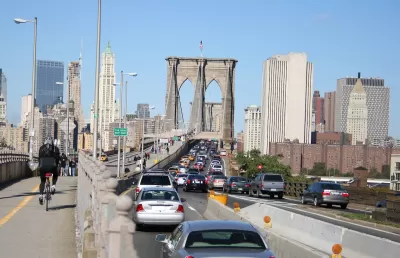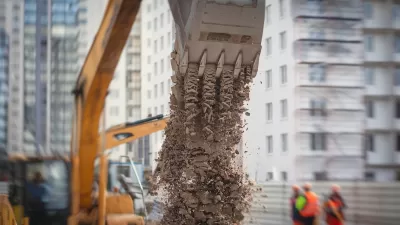Gov. Hochul’s surprise move to suspend the program, which would have started this summer, could be illegal.

New York Governor Kathy Hochul’s announcement that New York City’s congestion pricing program will not go forward as planned came as a shock to many, and now some critics of the move say it could be illegal.
But, as David Meyer explains in Streetsblog NYC, the governor could successfully put an end to the program because the Federal Highway Administration has yet to take a key step: signing a formal agreement with the MTA and city and state departments of transportation.
Nonetheless, the 2019 law that established congestion pricing said the state and MTA ‘shall’ implement tolls to enter Manhattan below 60th Street. Observers including U.S. Rep. Ritchie Torres and the Daily News Editorial Board argue that that language — not ‘may’ or ‘can,’ but ‘shall’ — compels Hochul and the MTA to enact the tolls.
According to Meyer, “Several constituencies could sue under Article 78 of state Civil Practice Law, which requires state or city officials to comply with their legal obligations under state law, but the memo suggests MTA board members would have the strongest, fastest case in court.”
In a response statement, the MTA says the governor’s axing of the program would jeopardize major capital investments: “Modernization and improvement projects like electric buses, accessible (ADA) stations and new signals will likely need to be deprioritized to protect and preserve the basic operation and functionality of this 100+ year old system.”
FULL STORY: Hochul’s Bid to Stop Congestion Pricing Might Be Illegal

Study: Maui’s Plan to Convert Vacation Rentals to Long-Term Housing Could Cause Nearly $1 Billion Economic Loss
The plan would reduce visitor accommodation by 25,% resulting in 1,900 jobs lost.

North Texas Transit Leaders Tout Benefits of TOD for Growing Region
At a summit focused on transit-oriented development, policymakers discussed how North Texas’ expanded light rail system can serve as a tool for economic growth.

Using Old Oil and Gas Wells for Green Energy Storage
Penn State researchers have found that repurposing abandoned oil and gas wells for geothermal-assisted compressed-air energy storage can boost efficiency, reduce environmental risks, and support clean energy and job transitions.

Santa Barbara Could Build Housing on County Land
County supervisors moved forward a proposal to build workforce housing on two county-owned parcels.

San Mateo Formally Opposes Freeway Project
The city council will send a letter to Caltrans urging the agency to reconsider a plan to expand the 101 through the city of San Mateo.

A Bronx Community Fights to Have its Voice Heard
After organizing and giving input for decades, the community around the Kingsbridge Armory might actually see it redeveloped — and they want to continue to have a say in how it goes.
Urban Design for Planners 1: Software Tools
This six-course series explores essential urban design concepts using open source software and equips planners with the tools they need to participate fully in the urban design process.
Planning for Universal Design
Learn the tools for implementing Universal Design in planning regulations.
Ascent Environmental
Borough of Carlisle
Institute for Housing and Urban Development Studies (IHS)
City of Grandview
Harvard GSD Executive Education
Toledo-Lucas County Plan Commissions
Salt Lake City
NYU Wagner Graduate School of Public Service





























